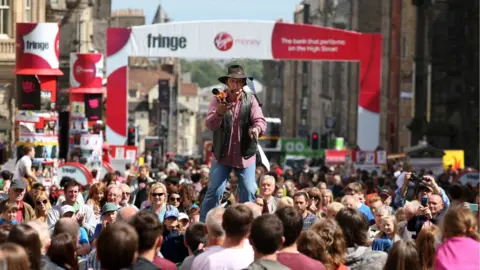Fringe tickets slump blamed on accommodation costs
 PA Media
PA MediaTicket sales for Edinburgh Fringe shows slumped by a quarter at some venues compared with 2019.
Major venues have warned that spiralling accommodation costs in the city are putting the event's future at risk.
In 2019, before the pandemic, eight major venues at the Edinburgh Festival Fringe sold 1,965,961 tickets.
But projected ticket sales fell by almost 25% in its first full year back to just 1,486,746.
A spokesman for EdFest.com - which is made up of the venues Assembly, Dance Base, Gilded Balloon, Just the Tonic, Pleasance, Summerhall, Underbelly and Zoo - said the fall in sales was a "major threat for everyone involved in the festival", and put the blame in part on train strikes, the climbing cost of living and the lingering effects of Covid.
"Chief among these however is the soaring cost of accommodation in Edinburgh in August - audiences and artists alike are being priced out of town, out of experiences," the spokesman warned.
"It is clear to anyone spending time in Edinburgh that there are fewer people in the city this year than in 2019.
"While there are certainly other factors that have affected audience numbers this year, the cost of accommodation is a perennial problem across the board."
 PA
PAOn Monday afternoon, the Edinburgh Festival Fringe said an estimated 2,201,175 tickets had been issued this year in total. This was across 3,334 shows which were performed by artists from 63 countries.
Fringe Society CEO Shona McCarthy said the figures were nothing short of a miracle, but that much had to be done to make the event the best version of itself, rather than the biggest.
She added: "We recognise the significant amount of work that is still required to support the long-term sustainability of this phenomenal festival.
"The eyes of the world look to this historic city every August, and we need to work together to ensure the Fringe is the best place for creatives to express their ideas, audiences to support them and for people across the sector to develop their skills and careers for the next 75 years."
It is not unusual over the Fringe to see desperate pleas on community Facebook groups of people asking to use a spare room because other options are too expensive, and there have been reports of hotels almost doubling their prices per night for during the festival.
Big names including Phoebe Waller-Bridge, Friends star David Schwimmer, comedian Eddie Izzard, and Dame Emma Thompson have seen the Fringe advance their careers.
But EdFest.com said that while suitable housing was not just an August problem "it's imperative that local and national government, landlords, the universities, Fringe venues and the Fringe Society all come together to find a lasting solution for this issue, or the future of the Fringe is in very real danger".
"Long term we also have to find solutions that allow the festival to be affordable to performers and the audience," an EdFest.com spokesman said.
"Given the extent of the reduction in sales, the overall festival has a major job to do in restoring the event to normality, which may take several years and require some public support.
"We need to stabilise the current situation where many people have made significant losses; to address the accommodation issue; to find ways of supporting work; and a major marketing campaign to get the audience back to the festival."
Benny Higgins, chairman of the Edinburgh Festival Fringe Society, said: "The importance of this festival cannot be underestimated. Artists use the Fringe as a place to perform, connect and springboard onto their next career opportunity.
"Recovery takes time, and that is why in June we launched our future development goals. The Society acts to offer anyone a stage and everyone a seat, and there is much to do in the coming months.


Eighty per cent was the figure we were quoted for the estimated return of visitors - performers and audiences alike.
So the 25% downturn anticipated by many Fringe venues was to be expected. Fewer visitors, buying fewer tickets at the fringe.
But with all six summer festivals returning for the first time since 2019, it was a chance to spread interest across the whole city.
Not everyone comes to Edinburgh for the Fringe. Some don't come for the festivals at all, and simply pass around the edges (perhaps wondering if the overflowing bins are in fact an artistic intervention by the art festival).
For all those here this summer, it's been (bins aside) a much more pleasant city to be in. The pressures of 2019 on public transport, and the city's infrastructure, reduced enough to make it that little bit easier to get around.
The numbers at the Fringe may have dipped but other festivals - that planned for smaller audiences and a slower recovery - look likely to have done better.
The Edinburgh International Festival - which has kept close tabs on its audiences over the last two years - found people booking later and booking fewer shows.
The Edinburgh International Book Festival - which has also been keeping its audiences connected online - reduced its programme. The result, a slow and steady return to form.
The mistake is to compare 2022 with 2019. These are very different times, and the challenges of this year will only multiply in the years ahead.
The quiet resilience of these festivals - and their importance to the city of Edinburgh - should be celebrated, before everyone moves on to planning for next year's events.
